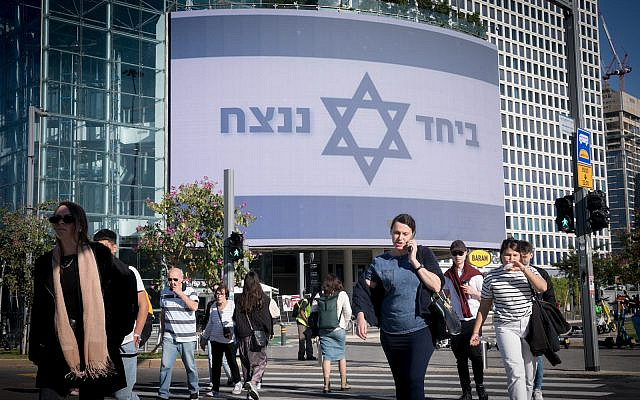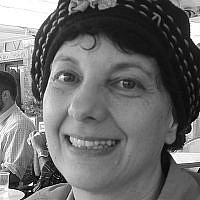Together, ununified, we can succeed

Earlier this week, at an important planning meeting for Women Wage Peace, the speaker wanted to say, “Together we will succeed.” She hesitated. Because this phrase, so important to the Jewish people for so long, has been hijacked.
It is everywhere – on billboards and in emails. When we first went into Gaza to rid it of Hamas and to rescue the hostages, I think we all believed it. We believed that somehow our disunity had contributed to our weakness and that if we found a way of pulling together and being united we would once again be invincible. For a few weeks, it looked like all differences had been set aside for the sake of victory.
That is no longer the case. The country is again divided. The billboards are read with cynicism or with regret.
- Some still think that we can win this war; many don’t.
- Some think that the army will be able to make it safe to return to their homes in the north and in the south; others feel that that goal is impossible.
- Some still believe it is important to kill as many Hamas members as possible; others are tired of the killing and have come to understand the implications of this policy.
- Some don’t think that civilian casualties in Gaza matter if they are “collateral damage;” others worry about the loss of life and the moral implications of civilian deaths.
- Some believe that we need to be responsible for ensuring that humanitarian aid reaches Gazans; others say there should be no aid until the hostages are released.
- Some believe the government is and was responsible for the October 7th disaster; others say they are holding off judgement until after the war and others make it quite clear that they do not hold the government responsible.
- Some believe that our army always behaves with utmost integrity and professionalism; others have doubts whether those high standards still apply.
- A growing number are calling for elections now; others believe that elections cannot take place until after the war.
- Many, many Israelis – the vast majority, according to recent polls – believe that the return of the hostages is the number one priority; some never believed it and others have decided that if the cost is too high, it should not be pursued.
We were never really united, except for being united in shock and grief – and that might not be such a bad thing. We have all realized that what is necessary for an army in the field may not be healthy for society. Unity is not an ideal. Togetherness is.
I am in favor of healthy argument. So is my Jewish tradition. A distinction is made between arguments for the sake of heaven, (like those of Hillel and Shamai), and arguments that are destructive, (such as those of Korach). However, our rabbis believed that most arguments can fall into the former category. Essentially, the Talmud, our guiding religious text, consists of arguments – very often unresolved.
There are some important elements to these arguments, though. They are conducted by people who share common values, who (mostly) exhibit mutual respect and who have a sense of duty to their students and the public. They are based on a shared grasp of the underlying facts and a shared desire to reach an outcome of which Heaven would approve.
I fear that these principles are lacking in the divisions in Israel today. There is a call for unity rather than for healthy disagreement. What is worse is that we do not share the same values, we do not respect those with different opinions and our so-called leaders show no sense of responsibility to their constituents.
The same people who most loudly call for unity are quite happy to put to the Knesset legislation that is opposed by half the population. The recent budget, which applied large cuts to social services and education and continued to fund government departments that were only instituted to give jobs to coalition partners, is a prime example. Legislation to expand the powers of rabbis or to exempt Haredim from army service is far from “unifying” yet it is still high on the government’s agenda. But we still hear demands for unity.
What they mean by “unity” is that everyone should submit to their views.
Those who think differently from them are labeled traitors.
One might have imagined that in a war, minimizing divisions might take priority. One might have thought that for the sake of “unity,” those who pretend to believe in it might have compromised by deferring measures that they know are most hurtful to those who did not vote for them.
Instead, the idea of “unity” now being touted is that we will all submit and be silent. It is the totalitarian model.
Israel remains the only democracy in the Middle East and we have reason to be proud of our open elections and many other freedoms. The current government does not understand democracy, though. That was evident in the pre-war campaign to undermine the judiciary and now, in the misguided calls for “unity” which are really calls for submission and silence.
Luckily, the government is not Israel! We have seen that soldiers can still defend the country, side-by-side, even if they vote differently. Most importantly of all, in a place where leadership is lacking, there is still a strong civil society that knows how to work together while upholding our differences.
All the divisions – those I have identified and many others not mentioned – do not have to break society apart. We have one common goal: a secure home for now and for the future. We will find a way to achieve it.
We can argue and still respect each other. We can disagree and still pull together. That is our strength – not unity, but togetherness. The billboards are not wrong; they are just distorted and exploited.

